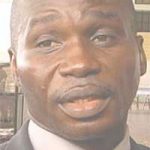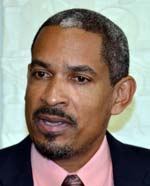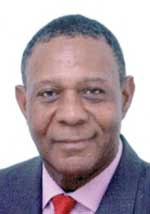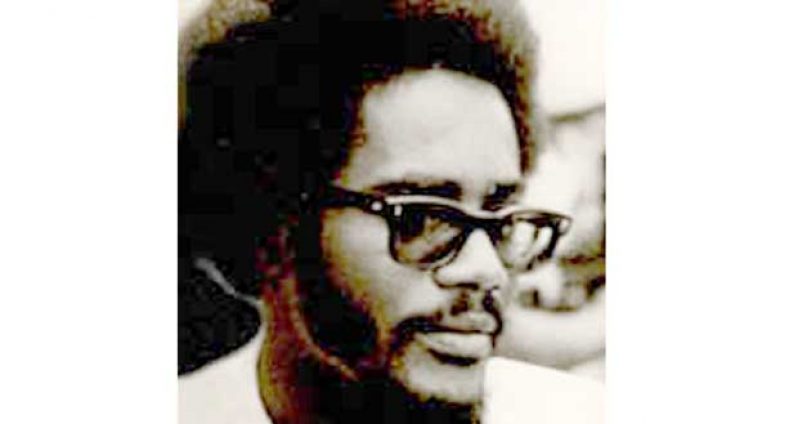Special Report on the Rodney Commission of Inquiry by Shaun Michael Samaroo
Rodney Commission faces tedious task to understand atmosphere under which Walter Rodney died as PNC paramountcy caused atmosphere of ‘depression and despair’
– Sir Richard Cheltenham
– Crime Chief James agrees with Counsel Pilgrim that Gregory Smith should have been court-marshalled as Army deserter
– PNC Government, GDF, Police never investigated assassination suspect Gregory Smith
Who plotted the shadowy mysterious political conspiracy that caused the brutal bomb blast execution of world-class Guyanese scholar Dr Walter Rodney? For 34 years the world has been wondering about that, in absolute frustration.And that vexing question dogs the Walter Rodney Commission of Inquiry today as it seeks to unearth crucial evidence to discover who caused the horrible act of Dr Rodney’s alleged political assassination, and why the popular political leader had to die so ignominiously.
Finding out why the sudden deadly bomb blast rocked Georgetown and assassinated the outstanding Guyanese historian at that historically defining moment on the night of Friday, June 13, 1980, is proving to be a tedious task, while raising troubling questions and alarming implications, with Commission Chairman Sir Richard Cheltenham noting that conditions in Guyana were not “normal” then.
Commission Chairman Sir Richard Cheltenham yesterday said the atmosphere of paramountcy at the time, when the People’s National Congress (PNC) Government ruled with an iron fist under a dictatorship that banned basic food

and restricted freedom of the press and citizens’ basic human rights, would have caused “depression and despair” in the society.
Finding out why the sudden deadly bomb blast rocked Georgetown and assassinated the outstanding Guyanese historian at that historically defining moment on the night of Friday, June 13, 1980, is proving to be a tedious task, while raising troubling questions and alarming implications, with Sir Richard Cheltenham noting that conditions in Guyana were not “normal” then.

Crime Chief, Senior Superintendent Leslie James, resumed the witness stand at the Presidential Commission of Inquiry in his marathon stay in the Box, and fended off intense questioning yesterday from Barbadian Counsel Andrew Pilgrim.
Pilgrim sought to establish why the Guyana Police Force neglected to pursue investigations of the controversial electronics expert Gregory Smith, a notorious Guyana Defense Force (GDF) soldier implicated in the political assassination of Dr Rodney on that dark night of Friday, June 13.
Evidence at the Commission reveals that a GDF plane flew Smith from Timehri Airport to a remote hinterland town the day after the assassination. Years later, Smith showed up living in French Guiana, and refused to return here to answer widespread suspicion that he played a key hand in Dr Rodney’s assassination. Smith died in French Guiana recently.
Days after the assassination, the only eye witness to the bomb blast, himself badly wounded, Donald Rodney, identified Smith as the suspect who supplied the deadly bomb, disguised as a communications device, to Dr Rodney. The device exploded in Dr Rodney’s lap as he sat in his car outside the Camp Street jail, and Donald, sitting in the passenger seat, escaped bloodied and in a

daze.
He sought help from members, friends and sympathizers of the Working People’s Alliance (WPA), the national political alliance that Dr Rodney led in a populist political opposition to the PNC Government.
Yesterday, Pilgrim led cross examination of Senior Superintendent James all day, and resumes Monday morning. Pilgrim questioned Senior Superintendent James based on a Guyana Police Force report titled “CID Report by Vernon Gentle”. The Report documents the findings of Police Officer Gentle, of the Criminal Investigations Department of the Police Force, who investigated Dr Rodney’s assassination. The Report is dated March 22, 1982, and considers the role of Donald Rodney, Walter’s brother, in the events of June 13, 1980.
Donald Rodney received serious injuries when the bomb that assassinated his brother exploded, and is the only eye witness to what happened in that moment. He is due to testify at the Commission.
This week marks the sixth session of the Commission, which President Donald Ramotar convened at the request of the widow of Dr Rodney, Dr Patricia Rodney, who testified this week, and wept as she recounted the fear and political harassment the Rodney family faced under the PNC government that ruled Guyana under a 28 year dictatorship.
The Rodney family received political asylum in the United States after her husband’s assassination, and now lives in Georgia, USA.
Yesterday, Counsel Pilgrim emphasised in his cross examination of Senior Superintendent James that the Guyana Police Force, the GDF and the PNC Government denied the existence of Gregory Smith, and never sought to question him, despite the accusations and suspicions swirling worldwide about his implication in the deadly events of June 13, 1980.
Under cross examination of Senior Superintendent James about the report of the International Commission of Jurists (ICJ) of May 2, 1995, into the assassination, Pilgrim revealed that no thorough investigation was ever conducted in Guyana about Dr Rodney’s death.
“No serious effort had been made … to identifying the persons involved in Dr Rodney’s death,” the ICJ report says.
Sir Richard Cheltenham directed Pilgrim to consider the atmosphere in Guyana at the time, where “with the aid of State agencies, all these people (are) gone”. The Commission Chairman said people the Commission may have an interest in to unearth the facts of the Dr Rodney assassination case “are all gone, Smith moved in a GDF plane. … Given the paramountcy of the times”, people would have felt their lives endangered, and they would have feared concerning their promotion prospects and so on, he said.
The Chairman lamented that “they are all gone, that is happening to all the relevant people. How they could get out like that, get passports, official documents. … We are trying to investigate people, people of interest to us – gone!”
Sir Richard wondered aloud if “we may not be wasting time” as so many records and relevant people to the cold case of Dr Rodney’s death are “gone.”
The Commission has so far unearthed mammoth information through its research, including files never before released, some from overseas. It has also gathered many witness statements and court room testimonies about the atmosphere and conditions that existed in Guyana in the period 1978 to 1980, when the nation plunged into the darkest era of its history as a Caribbean member state and a Commonwealth country.
This week saw intense drama at the Commission’s hearings, with Counsel for the PNC venting frustration and excusing himself from Wednesday’s session after a verbal fracas with the Commissioners. Yesterday, the Counsel table saw the absence of any PNC Counsel. The PNC has adopted an antagonistic stance towards the Commission, accusing it of political propaganda, a view that may impugn the distinguished character and reputation of the Caribbean Commissioners.
PNC Counsel Basil Williams hollered accusations at the Commissioners Wednesday that the Commission was “attacking” the PNC, and at one point said the Commission wanted to ruin the PNC.
However, Commission Chairman tried to calm Williams.
The Commissioners’ professional integrity and impartial legal character nullify widespread Opposition views that the Government of Guyana set up the Inquiry for political gain.
The 34-year old Dr Rodney cold case is the worst political assassination in the history of the Commonwealth Caribbean, and the Commission of Inquiry follows decades of international lobby for it to be convened, including a recommendation by the ICJ, and pleas from the Rodney family, the WPA and the international academic community, including several academics from Africa.





.jpg)








